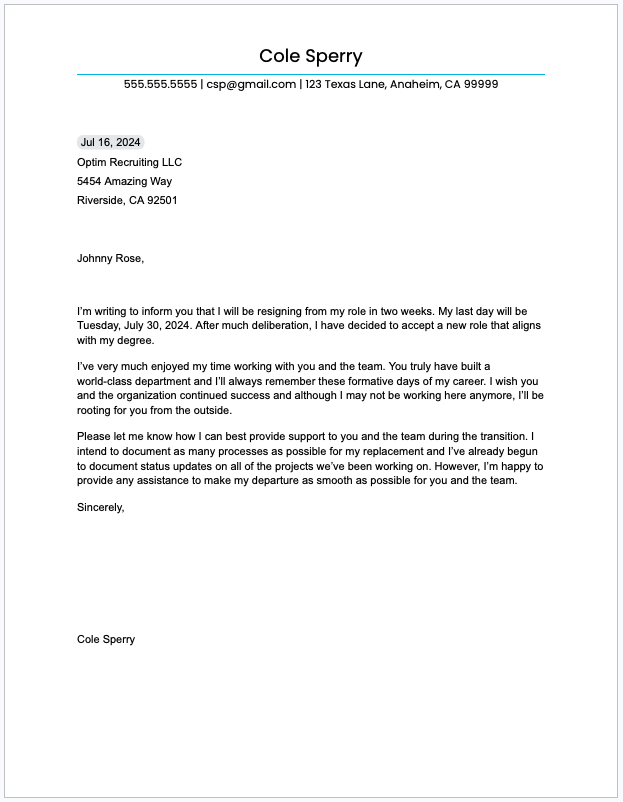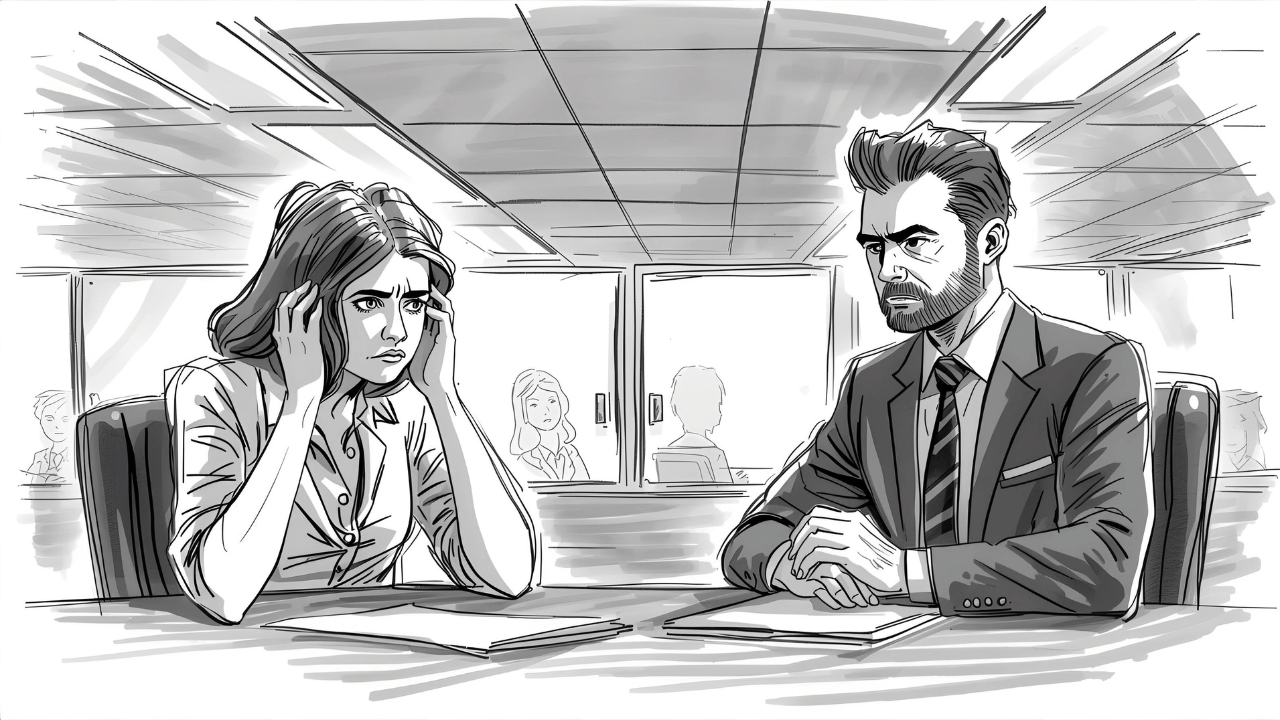Two Week Notice Letter [Template & Examples]
If you’re considering leaving your current employer, you may be wondering about all kinds of questions such as:
Do I have to give them a two weeks notice?
Should I give them a two weeks notice?
Do people still do this?
What happens if I don’t give them a notice?
How do I write a two-week notice letter?
How do I deliver the news?
Could I get fired for giving them a notice?
If you’ve been wondering about any of those questions, you’re in the right place. I’m going to cover all of them and more. Plus I’ll leave you with a template to use for your next notice letter and some examples to inspire your own.
Do You Have to Give Two Weeks Notice
The short answer is maybe. Some situations do legally require employees to give a notice before leaving. While more common in Europe, the US still has some limited situations that require you to give a notice.
Where did the two-week notice rule come from?
The 2-week notice really is more of a social norm than a rule and likely came about in the early 1900s. It was created during an era when employer and employee loyalty was at an all-time high. An era of pensions, and an era where many people retired from the same company they worked at for the majority of their life. It’s no surprise that professionals over 40 who lived during these times are more likely to give a 2-week notice. But should they? Should any of us give notice to our employer before quitting?
Are there situations where you may be legally required to give a two-week notice?
All 50 states have at-will employment with the exception of Montana. In Montana, employers can only fire an employee without cause during their initial probationary period. At-will employment means that an employer can terminate an employee at any time for any reason (with some exceptions) and that an employee is free to leave a job at any time for any reason - both without incurring any legal consequences. In other words, there is no law requiring you to give an employer any notice.
There are a few exceptions that may change your employment status from at-will:
Unionized jobs
Contract work
Employment contract (usually for executives)
In limited cases, you may be legally required to give notice to your employer. If you have any type of employment contract, be sure to check it when planning your exit. It’s also important to note that if your employment contract requires a notice, this can be interpreted to mean that you have a guaranteed right to remain employed during the advance notice period and cannot be walked out the door or terminated.
Of course, all of this is US-based. The rules drastically change for both employer and employee around the world with some countries requiring both parties to give up to a four-week notice. You can read all about notice periods around the world here.
Source: Jay Veniard, LinkedIn
How many people still give a two-week notice?
The number of professionals giving employers a two-week notice varies greatly by profession and industry. According to the Harris Poll, 55% of professionals gave former employers a two weeks notice. Another survey found that only 22% of professionals gave a two-week notice to their former employers. When you account for age, the proportion of individuals giving a notice to employers decreases significantly with 1 in 4 among Gen Z and millennials not giving a notice when resigning. One survey even found that 13% of employees ghost an employer when quitting - perhaps a more accurate definition of quiet quitting, literally.
Why Should You Give a Two-Week Notice?
I like to weigh the positives against the negatives when determining what is best. Here are some of the downsides and implications of not giving a two-week notice to your current employer when you resign from your job.
A majority of companies will not rehire you. You could immediately be put on a do-not-hire list for any role at any location with this company. While that may not seem like a bad thing now, keep in mind that one of the simple truths in life is that all things change. If you live in a region with limited opportunities or work in an industry with limited competition, this may be something to consider. While you may not want to work for the company now with its current leadership, what if things change later? Do you want to burn the bridge or keep it open for future possibilities?
An employer may withhold your pay. Let’s point out that this is illegal and plain wrong. However, pursuing legal action is emotionally draining and expensive. And unfortunately, in many cases, the costs to collect are often more than the lost pay.
If you are in an industry that is tight-knit, the kind where everyone knows everybody, leaving an employer in a bind could reflect poorly upon your reputation. The only thing that travels faster than good press, is bad press - and people will talk. Your reputation is currency and you should carefully determine the potential impact of it by not giving notice to your former employer.
You could damage your future employment relationship. Surprisingly, most good employers want you to give a two weeks notice to your former employer. By not doing so, you could be indicating to your new company that you would do the same to them and leave them in a bind.
By not giving your former employer notice, you could lose positive references from your past manager. If you have a good working relationship with your manager, you may not want to leave them in a bind (even if the company you work for is a less-than-great place to work).
You can lose out on unemployment benefits. In most states, you aren’t entitled to unemployment benefits if you quit voluntarily, but if you have good cause to quit, you may still be eligible. Leaving without any notice or ghosting an employer may complicate your ability to collect what is rightfully yours.
If you have an employment contract, there may be penalties for breaching it. In some situations, employees may have to pay damages or attorney fees for violating an employment contract.
The best policy is to always give a two-week notice to your employer and stick it out whenever possible. In most cases, the downsides of quitting a job without any notice outweigh the positives.
When Shouldn’t You Give a Two Week Notice?
There are some instances when you may not give notice before quitting a job. If your mental health is at risk, you’ve been harassed, you’ve been asked to do something illegal, or you have a personal family emergency, quitting a job without notice may be the right thing to do. The more important question to ask in these situations is, should you quit without having another job offer, can you afford (financially and emotionally) to go without pay until you find your next job?
How to Write a Two Weeks Notice
If you’ve decided at this point that it is best to give a two week notice, the next step is to actually write one. Don’t worry. I’m going to walk you through step by step and then give you a template and examples so even if you’re not the best writer in the world, you can still do this well.
Address the Letter
Two week notice letters follow a simple business letter format. Toward the top of the letter include:
The Date You Submit Your Resignation Letter (Often Today’s Date)
Your Current Company’s Name
The Company Address
The Name of the Recipient
The reason it’s written this way is because you want all these items documented clearly in your employment record with the company.
Here’s an example of what this section might look like:
July 16, 2024
Optim Recruiting LLC
550 Greenbelt Way
Riverside, CA 92503
Cole Sperry,
State Your Resignation Clearly
Start with the purpose of your letter - your resignation. This should clearly state that you are resigning and when your last day will be. Be clear; be specific. Most two-week notice letters have a resignation date effective 10 business days (two full weeks) from the date of your letter. In other words, you will give the employer 10 business days from the day you notify them.
Here is an example:
Please accept my notice of resignation effective on Tuesday, July 30, 2024 (two weeks from today).
You may also state your reason for leaving in the opening, but avoid pointing fingers, blaming others, and striking a negative tone. While it may make you feel good to air your grievances in a two-week notice letter, it won’t be productive or have any benefits to your career.
Here is an example that includes listing a reason for leaving:
I’m writing to inform you that I will be leaving the company in two weeks. Tuesday, July 30, 2024 will be my last day of work. After much deliberation, I have decided to accept a new role that aligns with my degree.
Express Gratitude If Possible
In almost every job I’ve ever held (even the ones I hated), there was always something I learned or I was grateful for. In your second paragraph, express that gratitude if you can in simple terms and keep it brief. The whole point of writing this letter and giving a two-week notice is to show respect to your manager and others you work with. Expressing gratitude is always a good thing to do.
Here is an example:
I’ve very much enjoyed my time working with you and the team. You truly have built a world-class department and I’ll always remember these formative days of my career. I wish you and the organization continued success and although I may not be working here anymore, I’ll be rooting for you from the outside.
Offer Assistance
Offer to assist with the transition. This could be as simple as providing a status update or spreadsheet of links to relevant tools to finish a job. The aim is to be helpful and be as available to help as possible - even if your employer chooses not to accept your help.
Here is an example:
Please let me know how I can best provide support to you and the team during the transition. I intend to document as many processes as possible for my replacement and I’ve already begun to document status updates on all of the projects we’ve been working on. However, I’m happy to provide any assistance to make my departure as smooth as possible for you and the team.
Close the Letter
I don’t think you need to say anything else besides the above. It’s often best to keep these letters short and sweet; however, if you genuinely want to stay in contact with your previous manager, you can mention something like that at the end. Simply close with the words Best or Sincerely followed by your full name.
If you are hand delivering a copy of the letter, you can leave four lines between your closing salutation and your name. You can then sign the letter after the salutation. If you are sending the letter electronically by email, you don’t need to sign it.
Two Week Notice Letter Template
Use this template to write a resignation letter. Simply put your information into the brackets.
[Date You Plan to Submit the Letter]
[Company Name]
[Company Address]
[Company City, State, Zip]
[Supervisor’s Name]
Please accept my resignation effective two weeks from today. My final day of work will be [Final Work Date]. [Reason for leaving - optional]
I appreciate the opportunity I’ve had to work with you and the team and all that I have learned and been able to accomplish during the past [X months/years].
Please let me know how I can help make this transition as smooth as possible. I’m happy to document processes, put together updates, and I will do everything possible to finish the current projects that I am working on.
Sincerely,
[Your Name]
Two Week Notice Letter Example and Template
Two Week Notice Email Template
In addition to delivering a resignation letter in person or attaching it to an email, you may also want to know what to write if you’re sending an email. Here is a template for a two week notice email.
Subject: Resignation Letter [Your Name]
[Supervisor’s Name]
Please accept my resignation effective two weeks from today on [Final Work Date]. [Reason for leaving - optional]
I appreciate the opportunity I’ve had to work with you and the team and all that I have learned and been able to accomplish during the past [X months/years].
Please let me know how I can help make this transition as smooth as possible. I’m happy to document processes, put together updates, and I will do everything possible to finish the current projects that I am working on.
Sincerely,
[Your Name]
**You can also attach your resignation letter to the email so they have a document to upload to your employee file in addition to your email (which could get lost eventually).
Two Week Notice Letter Example
Two Weeks Notice Letter Short and Sweet
I will be resigning from my position as [Job Title] effective two weeks from today with my final work day being [Date].
Thank you for the opportunity and all that I have learned while working here. Please let me know how I can help make this transition as smooth as possible.
Sincerely,
Two Week Notice Letter for Accepting a New Job
I regret to inform you that I’ve accepted a new job and I am submitting my two week notice. My last day will be [Date].
I’ve enjoyed my time here at [Company Name] and you’ve been one of the best mentors I’ve ever had.
I’m happy to provide any assistance you need over the next two weeks to make the transition as smooth as possible. Let me know what you need and I’ll do everything I can to complete it before I leave.
Sincerely,
Two Week Notice Letter for Moving
I’m writing to let you know my last day will be [Date]. My family has decided to move to [State].
I’ve very much enjoyed my time working with you and the team and I’ll always be rooting for your success.
Please let me know how I can make this transition as smooth as possible. I’d also love to stay in touch. Even if there is a question about one of my projects after I leave, please don’t hesitate to email me.
Sincerely,
Tips for Writing a Two Week Notice
Be Clear About Your Last Day
Don’t leave any doubt about the fact that you are resigning and what day will be your last day with the company. Your notice should be two full weeks or 10 business days from the day you submit your resignation. Be clear about that date.
Use Business Letter Format
It’s best to keep this in business letter format and formal. Your conversation with your manager may be more casual depending on your relationship, but keep your documentation professional. If you follow the outline I gave earlier, you’ll be within business letter formatting guidelines.
Keep It Brief
This isn’t the place to air your grievances unless you like burning bridges. This document will be attached to your employee file.
While it may feel good to “stick it to the man,” there is absolutely no benefit in doing so beyond a few moments of self-satisfaction. Strike a positive note whenever possible.
Plan for Immediate Departure
It is not uncommon to give your employer a notice of resignation and be walked out right then and there. We can only speculate about the reasons why, but some managers may fear that you won’t work as hard and they’ll be wasting money by keeping you around. Others may be concerned about you having access to sensitive information once they know you’re leaving, especially if you are leaving to work for a competitor.
How to Put In Two Weeks Notice
Do you remember your dating days? Or maybe you’re still in your dating years. Wasn’t it terrible when someone broke up with you via text? That would be the equivalent of sending your resignation letter to your hiring manager without talking to them first.
It’s shocking, it’s unprofessional, and it’s kind of cowardly.
Ideally, you want to deliver your resignation letter in person, face-to-face so that you and your manager can have a conversation.
Of course, there are exceptions. If you’ve been emotionally abused at work or you’ve been asked to do something unethical, then sure, maybe you don’t need to have a conversation first. Maybe you don’t even need to give a two-week notice in those cases.
But for most of us, it’s professional courtesy to speak to our manager first before delivering a cold resignation email. This gives your manager and yourself closure and provides the opportunity for each of you to ask questions and voice concerns before you part ways.
Once you have spoken to your manager to deliver the news, be sure to then send your resignation letter via email to both the manager and human resources so you have documentation of your last day and resignation in your employee file.
How to Leave a Job After Submitting a Two Week Notice
Here are some best practices to follow for your last two weeks on the job.
Finish any projects that you’re currently working on. If you can’t finish them, leave detailed notes about the status and outstanding items so someone else can easily jump in.
Document any processes and procedures that you follow when performing your daily work duties that may not already be documented.
Write down any helpful tips and advice for someone else to make it easy for them to complete your work during your absence. Most likely this will be one of your team members while recruiting takes place to backfill your role.
Cross-train others on your work as your manager allows.
Delete all personal items from your work computer if you stored anything there. In fact, I would do this before submitting my notice.
Delete any work emails or related items that you may have on your phone or personal electronics. The last thing you want is a former employer accusing you of stealing company secrets.
Say goodbye to everyone and exchange contact information with colleagues you wish to stay in contact with before your last day.
Two Week Notice Letter Recommended Reading
Cole Sperry has been a recruiter and resume writer since 2015, working with tens of thousands of job seekers, and hundreds of employers. Today Cole runs a boutique advisory firm consulting with dozens of recruiting firms and is the Managing Editor at OptimCareers.com.

















